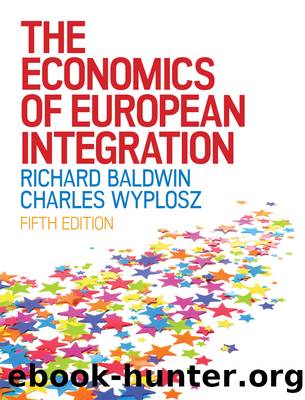EBOOK: The Economics of European Integration (UK Higher Education Business Economics) by Wyplosz Charles & Baldwin Richard

Author:Wyplosz, Charles & Baldwin, Richard [Wyplosz, Charles]
Language: eng
Format: epub
Publisher: McGraw-Hill Education
Published: 2015-03-15T16:00:00+00:00
The Commission convicted four brewers of running a cartel in the Netherlands (the Heineken group, Grolsch, Bavaria and the InBev group). Beer is big business for the Dutch; yearly consumption is something like 80 litres per inhabitant! The four brewers involved sold a total of around 1 billion euros annually, and had a combined market share of over 90 per cent. The collusion was quite formally coordinated. According to the Commission’s investigation, between 1996 and 1999 the four brewers held numerous unofficial meetings, during which they coordinated prices and price increases of beer. Such activity was successfully hidden from the authorities; however, when the Commission uncovered a cartel in the Belgian beer market one of the players in that case – InBev – provided evidence in order to reduce its fine. This is a tactic – the so-called leniency policy – that the Commission uses with great effect as it essentially faces the cartel members with a Prisoners’ Dilemma. After the tip-off from InBev, the Commission raided (conducted a ‘surprise inspection’ of) brewers in France, Luxembourg, Italy and the Netherlands.
The raids involved collecting handwritten notes taken at unofficial meetings and proof of the dates and places when these meetings, called ‘agenda meetings’, ‘Catherijne meetings’ or ‘sliding scale meetings’, had taken place. The attendees at these meetings coordinated prices and price hikes at bars and stores. The Commission also found evidence that board members, managing directors and national sales managers actually participated in these meetings. Moreover, evidence was gathered that showed that the companies were well aware that what they were doing was illegal. Indeed, they employed cloak-and-dagger techniques to avoid detection (code names, abbreviations and holding meetings in various hotels and restaurants). One wonders whether they brought their own beer to avoid the high prices!
In the words of then-Competition Commissioner Neelie Kroes (the commissioner who oversaw an historic expansion in the effectiveness of the EU’s competition policy in the 2000s): ‘It is unacceptable that the major beer suppliers colluded to hike up prices and carve up the market between themselves.’ The companies were fined a total of about 270 million euros. InBev escaped without a fine.
Download
This site does not store any files on its server. We only index and link to content provided by other sites. Please contact the content providers to delete copyright contents if any and email us, we'll remove relevant links or contents immediately.
International Integration of the Brazilian Economy by Elias C. Grivoyannis(57322)
The Radium Girls by Kate Moore(10907)
Turbulence by E. J. Noyes(7039)
Nudge - Improving Decisions about Health, Wealth, and Happiness by Thaler Sunstein(6633)
The Black Swan by Nassim Nicholas Taleb(6190)
Pioneering Portfolio Management by David F. Swensen(5606)
Rich Dad Poor Dad by Robert T. Kiyosaki(5149)
Zero to One by Peter Thiel(4824)
Man-made Catastrophes and Risk Information Concealment by Dmitry Chernov & Didier Sornette(4735)
Secrecy World by Jake Bernstein(3782)
Millionaire: The Philanderer, Gambler, and Duelist Who Invented Modern Finance by Janet Gleeson(3569)
Skin in the Game by Nassim Nicholas Taleb(3460)
The Age of Surveillance Capitalism by Shoshana Zuboff(3422)
The Money Culture by Michael Lewis(3284)
Skin in the Game: Hidden Asymmetries in Daily Life by Nassim Nicholas Taleb(3264)
Bullshit Jobs by David Graeber(3179)
The Dhandho Investor by Mohnish Pabrai(3168)
The Wisdom of Finance by Mihir Desai(3078)
Blockchain Basics by Daniel Drescher(2890)
